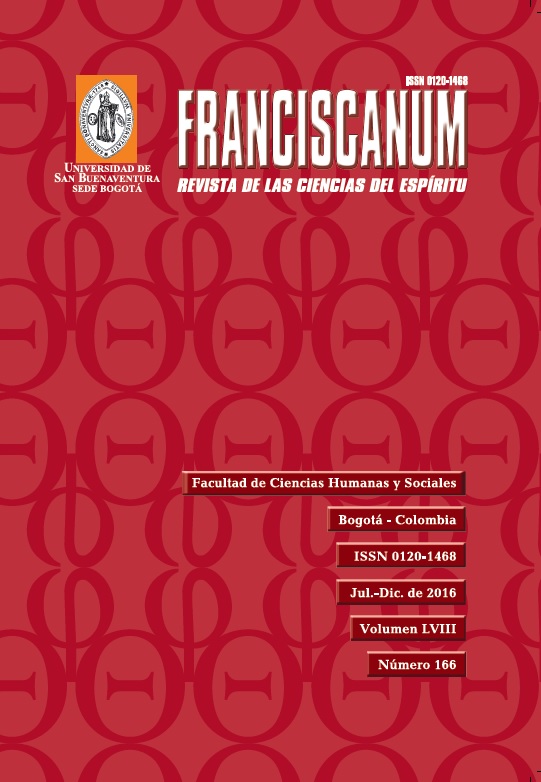This journal provides immediate open access to its content, based on the principle that giving the public free access to research helps a greater global exchange of knowledge.
Therefore, the Creative Commons 4.0 Attribution Attribution - Equal Share (by-sa) License is accepted: The commercial use of the work and the possible derived works is permitted, the distribution of which must be done with a license equal to that regulates the original work.
http://creativecommons.org/licenses/by-sa/4.0/
Along these same lines and in line with the Open Access policy, it is clarified that the authors maintain their rights to articles, without restrictions and, in the same way, they maintain their publication rights, without restrictions. They are only asked to reference the number of the Franciscanum magazine where the article initially appeared.
Abstract
References
Byrne, Brendan. A Costly Freedom. A theological Reading of Mark’s Gospel. Collegeville: Liturgical Press, 2008.
Calvo Martínez, José Luis, trad. Textos de magia en papiros griegos. adrid: Gredos, 1987.
Carbullanca Núñez, César. «Los signos de los tiempos: apuntes sobre el sentido teológico de la historia en el evangelio de Marcos». Teología y Vida 49 (2008): 649-672.
Collins, Adela Yarbro. Mark: a commentary. Minneapolis: Fortress, 2007.
Culpepper, Richard Alan. Mark. Macon: Smyth & Helwys Pub., 2007.
Cunningham, Scott. «The healing of the Deaf and Dumb Man (Mark 7:31-37), with Application to the African Context». Africa Journal of Evangelical Theology 9:2 (1990): 13-26.
Donahue, John y Harrington, Daniel. The Gospel of Mark. Collegeville: Liturgical Press, 2002.
Dunn, James D. G. El cristianismo en sus comienzos: Tomo I. Jesús recordado. Estella: Verbo Divino, 2009.
Escuela bíblica y arqueológica de Jerusalén, edit. Biblia de Jerusalén. Bilbao: Desclée de Brouwer, 2009.
Estévez López, Elisa. «“Y todos los que lo tocaban quedaban sanados”: el cuerpo como espacio de gracia». Sal Terrae 100 (1997): 323-336.
Gil, Luis. «Las curaciones milagrosas del Nuevo Testamento a la luz de la medicina popular». En La frontera de lo imposible. Magos, médicos y taumaturgos en el Mediterráneo antiguo en tiempos del Nuevo Testamento, editado por Antonio Piñero, 197-216. Córdoba: El almendro, 2001.
Gregorio Magno. Obras de San Gregorio Magno: Regla pastoral. Homilías sobre la profecía de Ezequiel. Cuarenta homilías sobre los evangelios. Madrid: bac, 1958.
Iersel, Bastian Martinus Franciscus van. Mark: A Reader-Response Commentary. Sheffield: Sheffield Academic Press, 1998.
Léon-Dufour, Xavier, dir. «Magia». En Vocabulario de teología bíblica, 500-501. Barcelona: Herder, 2001.
Léonard, Philippe. Evangelio de Jesucristo según San Marcos. Estella: Verbo Divino, 2007.
Mateos, Juan. Los «Doce» y otros seguidores de Jesús en el Evangelio de Marcos. Madrid: Cristiandad, 1982.
Marcus, Joel. El evangelio según Marcos (Mc 1-8). Salamanca: Sígueme, 2010.
Meier, John Paul. Un judío marginal. Nueva visión del Jesús histórico. Vol. ii Tomo i. Estella: Verbo Divino, 1998.
Metzger, Bruce, ed. The Greek New Testament. Stuttgart: Deutsche Bibelgesellschaft, 2000.
________. Un comentario textual al Nuevo Testamento griego. Sao Paulo: Sociedades Bíblicas Unidas, 2006.
Moloney, Francis James. The gospel of Mark. A commentary. Grand Rapids: Baker Academic, 2012.
Nestle, Eberhard y Aland, Kurt. Novum Testamentum Graece.
Stuttgart: Deutsche Bibelgesellschaft, 2012.
Pikaza Ibarrondo, Xabier. Evangelio de Marcos. La buena noticia de Jesús. Estella: Verbo Divino, 2012.
Smith, Morton. Jesus the Magician. San Francisco: Harper & Row, 1978.
Rahlfs, Alfred, ed. Septuaginta: Id est Vetus Testamentum graece iuxta lxx interpretes. Stuttgart: Deutsche Bibelgesellschaft, 2006.
Räisänen, Heikki. The Messianic Secret in Mark. Studies of the New Testament and Its World. Edinburgh: T. & T. Clark, 1990.
Rowland, Christopher. The Open Heaven. A study of Apocalyptic in Judaism and Early Christianity. New York: Crossroad, 1982.
Ruis-Camps, Josep. El evangelio de Marcos: etapas de su redacción. Redacción jerosolimitana, refundición a partir de Chipre, redacción final en Roma o Alejandría. Estella: Verbo Divino, 2008.
Theissen, Gerd. Colorido local y contexto histórico en los evangelios. Una contribución a la historia de la tradición sinóptica. Salamanca: Sígueme, 1997.
________. La religión de los primeros cristianos. Una teoría del cristianismo primitivo. Salamanca: Sígueme, 2002.
________. The Miracles Stories of the Early Christian Tradition. Augsburg: Fortress, 2007.
Winn, Adam. Mark and the Elijah-Elisha narrative. Considering the practice of Greco-Roman imitation in the search for Markan source material. Eugene: Pickwick Publications, 2010.
Witherington III, Ben. Gospel of Mark. A Socio-Rhetorical Commentary. Grand Rapids: Eerdmans Publishing Company, 2001.
Zerwick, Max y Grosvenor, Mary. A Grammatical Analysis of the Greek New Testament. Vol I. Roma: Biblical Institute Press, 1974.



















